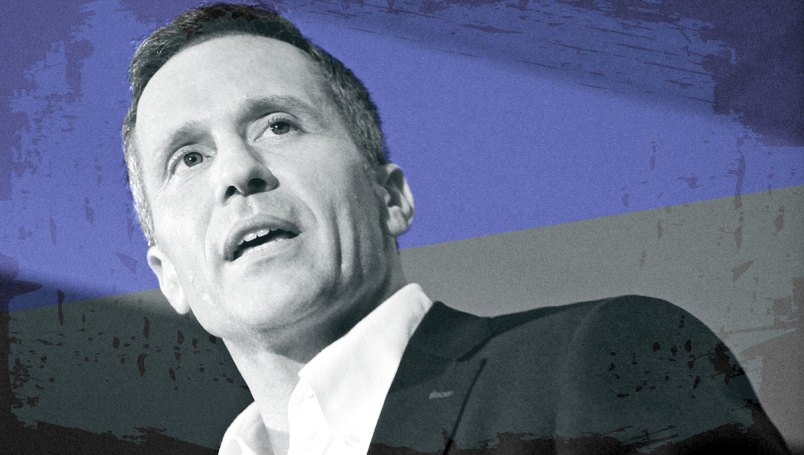On Monday morning, Missouri Gov. Eric Greitens sat in a St. Louis courtroom watching potential jurors answer questions about allegations that he attempted to blackmail his one-time lover.
By late afternoon, the case had collapsed.
St. Louis Circuit Attorney Kim Gardner abruptly dropped the felony invasion of privacy charge she had brought against the governor in February, saying she would seek to hand the case over to a special prosecutor, who could choose to file new charges.
Greitens took to the courthouse steps to declare his “great victory.”
Calling himself a “changed man,” the governor reiterated that he was “innocent” of charges that he tied his former hairdresser up in his basement and took a photo of her semi-nude body to keep her silent about their 2015 affair, which ended shortly before his run for office.
In reality, the twice-indicted governor’s legal and political troubles are far from over. But he dodged this particular bullet thanks to a combination of prosecutorial errors, a difficult-to-prove charge, and one final, decisive ruling from Circuit Judge Rex Burlison, who oversaw the case.
The final blow came Monday, when Burlison agreed to let Greitens’ team call Gardner as a witness in the case she had spent months prosecuting. The defense argued that Gardner was aware that one of her investigators had committed perjury and mishandled key aspects of their investigation.
In a biting statement, Gardner’s office said that the judge’s ruling put her in an “impossible position” in which she would be subject to cross-examination by her own subordinates. Gardner was left with “no other legal option than to dismiss and refile this matter,” the statement continued.
Still, the collapse of the case may not revive Greitens’ political standing. The legislature is moving full steam ahead with a special session to debate Greitens’ possible impeachment, which begins Friday evening. A House committee investigating allegations against the governor is expected to release a report laying out its recommendations next month.
As House leaders pointed out, the abrupt cancellation of Greitens’ pending criminal trial leaves him with plenty of time to sit down and testify about “his side of the facts.”
As for the criminal case, the concerns at issue date back to the first deposition of the woman at the heart of the case on Jan. 29, soon after Gardner’s probe began.
William Tisaby, the investigator who conducted that interview alongside Gardner, later appeared to lie to the defense about key aspects of how it transpired. Tisaby said that he took no notes during the interview — a claim contradicted by a video of the conversation that was belatedly provided to defense lawyers.
Judge Burlison ultimately sanctioned prosecutors for failing to promptly turn over to the defense relevant evidence, like the video and 11 pages of notes Tisaby took while interviewing the woman’s friend.
These missteps helped Greitens’ team frame the investigation as tainted from the start, and Gardner’s office acknowledged that they made a mistake in relying on Tisaby.
Even without those unforced errors, prosecutors had a difficult path towards securing a guilty verdict. Under the relevant Missouri felony statute, they needed to prove that Greitens transmitted the nude photo in a way that would make it accessible via computer. But, crucially, they did not have access to the photo itself.
Searches of the governor’s smartphone and Apple cloud data found no evidence of the image, and no witness, including Greitens’ ex-lover, has ever seen it. The judge barred testimony from three expert witnesses for the prosecution, including two electrical engineers who could speak to the technical issues regarding the photo’s potential transmission, and a law professor slated to testify about revenge pornography.
That left prosecutors with only the woman’s testimony and corroborating accounts from her ex-husband and friend. According to the woman, she saw a camera flash through her blindfold, heard the distinctive click of an iPhone camera shutter, and then heard Greitens threaten that the photo would appear “everywhere” if she told anyone what had transpired.
Greitens’ team moved several times to dismiss the case due to the lack of hard evidence. On Monday, they also called on Gardner to drop an unrelated felony computer tampering charge she brought against Greitens for allegedly misusing a charity donor list to fundraise for his gubernatorial campaign.
“I think anything that this circuit attorney’s office has touched or its investigators should be dropped because it’s tainted. It’s biased,” attorney Scott Rosenblum told reporters outside the courthouse.
Gardner’s office said they would seek a special prosecutor to assume control of the invasion of privacy charge. The special prosecutor, who would most likely be based in another Missouri county, would have 27 days from Monday to re-file the charges before the statute of limitations expires, according to the Kansas City Star.
Gardner’s spokeswoman, Susan Ryan, noted that the charge could also be re-filed as a misdemeanor, which would not require providing that the photo was made available via computer.
Ryan did not immediately return TPM’s request for comment on whether the computer tampering case, which legal experts have argued is much stronger, will also be assigned to a special prosecutor.







Let’s just go ahead and add “IOKIYAAR” to the Constitution already.
And the scum shall inherit the earth
In a nutshell, this is the difference between Democrats and Republicans. Republicans go to the mat every single time. You will have to pry it out of their cold dead hands. Democrats just don’t have the stomach to assume or keep power.
“When the GOP sends its people, they’re not sending their best. They’re bringing infidelity. They’re bringing crime. They’re rapists. And some, I assume, are good people.”
“And some, I assume are good people.” Don’t ever make that mistake - my rule for the past 30 years is NEVER, EVER, EVER, EVER vote for the Republican. Has been proven true every time.